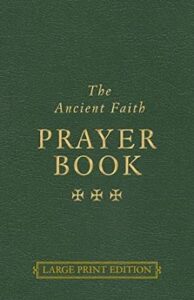
Great Lent is a time to concentrate on prayer and, as I see it, to “experiment” with prayer. In the Orthodox Church, personal prayer is not a “one size fits all” thing. Except for the very basics, each of us is allowed to (and should) adapt our prayer life to our situation and abilities. Since I suspect none of us would say we pray as we ought, I believe we should use Lent to take a look at our prayer life to see what is “working” and what is not, so we can pray better during the remainder of the year.
I am not going to pretend here to be a Church Father – though sometimes I feel old enough to be one! * The Fathers tend to set forth the highest ideals towards which we all should certainly aim – which is why I  have included in this Post a few of their sayings. As for me, despite my vocation and despite the fact that I have been seriously trying to pray for about sixty years now, I still do not pray very well. Nonetheless, I think I have discovered a few practical things which may be helpful to others who are down here with me, plodding along.
have included in this Post a few of their sayings. As for me, despite my vocation and despite the fact that I have been seriously trying to pray for about sixty years now, I still do not pray very well. Nonetheless, I think I have discovered a few practical things which may be helpful to others who are down here with me, plodding along.
- Actually, Bishop Kallistos pointed out that Church Fathers are not restricted to ancient times. Some of today’s great scholars, hesychasts and intercessors may in time be recognized as Church Fathers and Mothers. I wonder if he will turn out to be one of them.
1 Why should we pray?
We are the appliance at the end of the cord. Prayer is the plug at the other end of the cord. Prayer keeps us plugged into the “electricity” that keeps all things going – connected with God Who is the Source of power and life and light and truth. If we don’t keep connected… My little pocket radio, which I sometimes listen to during the night when probably I should be praying, has re-chargeable batteries which can run on their own for a few days, but if I don’t recharge them my radio goes dead, usually right in the middle of the night when I want it. Point taken.
Frequently the Gospel accounts tell us how people were looking for Jesus and found Him off in a lonely place by Himself praying. Our Lord Jesus Christ, the Son of God, needed much prayer. How ever can we think we do not?
2 When should we pray?
Anytime, of course. I don’t mean you should read an Akathist as you drive down the road! However, at almost any moment we can send up a “Jesus Prayer” or a simple “Lord, have mercy” or sometimes just “Help, Lord”. Anything to keep in contact.

Our most important prayers take place every Sunday morning in church. This is fundamental, basic. The Divine Liturgy sets the pattern for our personal prayers. * Then our personal prayers during the week feed into our worship at Liturgy on Sundays.
- Why do I not say “private” prayers? Because for Christians there is no such thing as a private prayer. We pray always as members of the Church, connected integrally with the saints in Heaven and all who have gone before us, as well as our brothers and sisters on earth. Christ did not teach us to pray “My Father…” but rather “Our Father…”
When should we take time to pray? Certainly every morning and every evening. In the morning, as your feet hit the floor, make the sign of the cross and say “Thank you, Lord, for letting me see another day”, and then ask God’s blessing on your day. Before you go to sleep at night, thank God for the blessings of the day – there’s so much we take for granted. Pray for those you especially care about. And if there’s anything you’ve done wrong, ask God to forgive you.

When should you do most of your praying? That depends on 1) when you have time, obviously, and 2) whether you’re a “morning person” or a “night person”. I’m a morning person, so that’s when I do most of my praying. For years I tried to do extensive prayers before I fell asleep – and in fact all I did was fall asleep. It’s lovely to fall asleep in the presence of God, but that’s not what we should aim for. So I do most of my praying in the morning. (I can do that because I’m still semi-retired and usually have time then.) So find what works for you. Just so you pray. As I said, try also to pray during the day – an Our Father or a Jesus Prayer or a “Lord, have mercy” every so often. *
- A confession: I am not good at this. Almost every morning I ask God to help me to remember to pray during the day. Almost every day I forget. I wonder if Saint Paul had the same problem: “Likewise the Spirit also helps in our weaknesses. For we do not know what we should pray for as we ought, but the Spirit Himself makes intercession for us with groanings which cannot be uttered.” Romans 8:26 I hope the Holy Spirit is praying within me when I forget.
3 How much time should we spend in prayer?
That also depends entirely on our situation. Take two extremes: Those who are retired – which I am (or was) – should spend a considerable amount of time in prayer. That is one of the responsibilities of – and gifts to – Christians who have time, who are retired or shut in or laid up for some reason. On the other hand, for those who are extremely busy (like a mother who is working full time, and has a young child or three to care for (a not unusual situation these days) an occasional “Help, Lord” with the Lord’s Prayer thrown in twice a day is probably sufficient. We each need to work that out for ourselves.
A word of warning for any who are not in the habit of praying: Start with a little time in prayer and then increase the time, as you can. I read about a woman who decided to spend an hour a day in prayer. It was too much. After a few days she gave it up altogether. She should have begun with five minutes.
4 What should we pray?
Use some of the Church’s daily prayers, so that you can pray with the Church. (As I said, there are no private prayers.) There are many little Orthodox prayer books, which contain the Church’s traditional morning and evening prayers for personal use, along with prayers for many occasions. Note: We are not obligated to use all the appointed daily prayers. (In fact, the introduction to many of the prayer books makes this clear.) Use the prayers for which you have time, or which are especially meaningful to you. The book I have used for several years, now – I just love it – is The Ancient Faith Prayer Book, available from the Ancient Faith Store, Amazon and many other places. A particularly handy one is the Pocket Prayer Book published by the Antiochian Archdiocese – handy because it actually will fit in a shirt pocket. However, the print is very small. I call it the “prayer book for the near-sighted”.
said, there are no private prayers.) There are many little Orthodox prayer books, which contain the Church’s traditional morning and evening prayers for personal use, along with prayers for many occasions. Note: We are not obligated to use all the appointed daily prayers. (In fact, the introduction to many of the prayer books makes this clear.) Use the prayers for which you have time, or which are especially meaningful to you. The book I have used for several years, now – I just love it – is The Ancient Faith Prayer Book, available from the Ancient Faith Store, Amazon and many other places. A particularly handy one is the Pocket Prayer Book published by the Antiochian Archdiocese – handy because it actually will fit in a shirt pocket. However, the print is very small. I call it the “prayer book for the near-sighted”.
If you want to go deeper and pray some of the many variable hymns appointed for daily Matins (Orthros) and Vespers, here is the best site I’ve found: http://st-sergius.org/services.html – published by the Russian Orthodox Church in England. It’s free, despite the fact that it must have been a massive project to get all of it online. If you want to delve into it and are totally perplexed by its complexities, let me know and I’ll try to help. Over the years I have found that the hymns of the Orthodox Church have taught me Orthodoxy even better than have the books of theology.
Intercede: Pray for people, the people you love. Also for people you hate or dislike, because Jesus commanded that. (We are not allowed to pray that they drop dead!) Keep a list of people you want to pray for. I keep my list on my computer.
 Do we need to say specific prayers for each person? No. For me it would be impossible. Over the past 75 years I have been praying for ever more people. Let me tell you: this makes for a very long list which keeps getting longer, because we Orthodox believe in prayers for the departed. So when people die we keep praying for them.
Do we need to say specific prayers for each person? No. For me it would be impossible. Over the past 75 years I have been praying for ever more people. Let me tell you: this makes for a very long list which keeps getting longer, because we Orthodox believe in prayers for the departed. So when people die we keep praying for them.
This, by the way, is a great blessing. I was raised in a church where prayers for the dead were not permitted. By the time my parents died I was in a church that permitted such prayers – and I swear, if I couldn’t have kept praying for them, I think I couldn’t have handled it. This is our continuing connection with our departed loved ones. Recently we have been delving into our family history, and for reasons I can’t explain I have begun praying for a family member who died before I was born, and somehow I’m becoming close to him. I’m eager to meet him.
The original point: The solution is that I pray specifically for people when there are urgent needs. Otherwise I just say “Lord, have mercy on N”. I figure God knows what they need far better than I do. Since I have people listed by groups (from my early life, from my former churches, and so on), when I’m short of time (or when I’m lazy…) I say “Lord, have mercy on…” and just read through the group, taking care to think of each of them. I hope that’s not cheating.
Let me tell you something very strange: As I pray through these names, occasionally one of them “pops out” – I don’t know how else to describe it. Then I email or call the person, and almost invariably there is a reason for it: they have a particular problem or need or were about to call or email me. I do consider this the immediate work of the Holy Spirit.
Talk to God in your own words. Tell Him your needs and fears and hopes and joys. Even though He already knows, even if your words are halting, He wants to hear from you directly, as any good Parent does. He cares about you. Don’t save this for times when you’re very needy, as I tend to do. (I can see already that writing this Post is going to shape me up, if only out of embarrassment.)
Just be with God. There’s the story about the Scottish pastor who every day saw this old man go into church and sit down and come out again half an hour later. Finally he asked him what he was doing in there. The old man said: “I’m just looking at God and He’s looking at me”. Prayer is an end in itself. We don’t have to pray about anything. We pray to God because He is God, and it’s good to be with Him. That’s enough.
 Some Orthodox spend time with God by looking at an icon. Now, I know some holy men say we should pray without using images, because God in His essence has no image – praying rather like the old Scotsman in his undecorated Calvinist church.
Some Orthodox spend time with God by looking at an icon. Now, I know some holy men say we should pray without using images, because God in His essence has no image – praying rather like the old Scotsman in his undecorated Calvinist church.
I don’t know what to make of that prohibition. God has taken an image and I find that looking at Christ or my special saints is very helpful. When I look at the icon of Christ, I see Him loving me. When I look at the Mother of God, I feel peace and calm flowing out from her – something I especially need right now. When I look at my patron Saint Basil, he (who did so many good things in so few years) always tells me, “Get moving, man.” (I don’t like him! but I need him.) When I look at Saint Nicholas, he points out to me that he brought me to the Orthodox Church, and that he founded our (or rather his) Saint Nicholas Church, Cedarburg, and that he did so for a reason and therefore, despite our present difficulties, he has things under control – and thereby he settles my worries. Personally, I think there is everything to be said for looking at icons.
 Many devout Orthodox spend time with God using the Jesus Prayer. Some use a prayer bracelet or rope – a Jesus Prayer for each knot on the rope. (This is our Orthodox version of the Rosary – only ours centers on Christ instead of Mary.) If you can pray this way, it’s a great blessing. I can’t. I have such a wandering mind that by the time I get to about the fifth “Lord Jesus Christ, Son of God, have mercy on me”, I’m thinking about something else – not bad things, just not Jesus. In order to pray, I need to look at an icon or use the Church’s written prayers, and even then… if my mind wanders, I tell God I’m sorry and move on.
Many devout Orthodox spend time with God using the Jesus Prayer. Some use a prayer bracelet or rope – a Jesus Prayer for each knot on the rope. (This is our Orthodox version of the Rosary – only ours centers on Christ instead of Mary.) If you can pray this way, it’s a great blessing. I can’t. I have such a wandering mind that by the time I get to about the fifth “Lord Jesus Christ, Son of God, have mercy on me”, I’m thinking about something else – not bad things, just not Jesus. In order to pray, I need to look at an icon or use the Church’s written prayers, and even then… if my mind wanders, I tell God I’m sorry and move on.
I suppose I’ve emphasized this enough already, but let me be clear again: The fact that I have discovered some things about prayer does not mean I pray well. One can know many facts about the automobile and still be a poor driver. Beware.
So I suggest that during Lent you experiment (as I still am after these many years): Try to find out what sort of prayer works best for you, and then go with that. However we do it, what’s most important is that we spend time with God who loves us. Pray. Pray. Pray.

Next Week: The Annunciation and the Akathist Hymn
Week after next: How to make lemonade out of lemons – Saint Joseph the Hymnographer